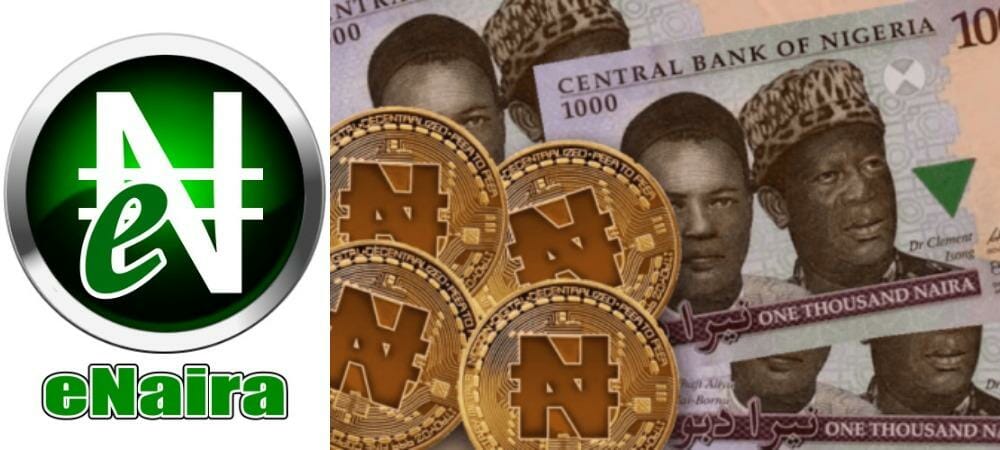Nigeria has become the first African country to launch its Central Bank Digital Currency (CBDC) called eNaira. This comes after the ban of cryptocurrency in the country by the Central Bank of Nigeria led by Mr. Godwin Emefiele. Nigeria is the second-largest market for crypto trading in the world, only second to the United States of America, as many Nigerians use the cryptocurrency to protect their savings against naira depreciation.
Central banks control the circulation and supply of money globally. The rise of cryptocurrency poses a threat to their authority, control, and power, which led many countries like Nigeria to ban the trade of cryptocurrency in the country. This has also led central banks around the world to start producing their own digital currencies.
“The adoption of the central bank digital currency and its underlying technology, called blockchain, can increase Nigeria’s gross domestic product by $29 billion over the next 10 years.”, President Muhammadu Buhari said in a speech at the launch in Abuja, the capital on Monday 25th October 2021, at the official launch of the eNaira.
According to Director, Information and Technology, CBN, Rakitya Muhammed, the introduction of eNaira can catalyse Nigeria’s digital economy, boost cross border trade and enable better macroeconomic policy formulation. The apex bank had earlier revealed that it would be launching eNaira, a digital equivalent of the naira in October, in line with global trends.
Global Adoption of CBDC
As of July 2021, eighty-one countries were exploring their digital currencies, according to a new tracker. The Atlantic Council’s Geoeconomics Center recently unveiled a new central bank digital currency tracker featuring an interactive database.
This digital currency is comparable to Bitcoin or Ethereum but is issued and backed by an official central bank instead of created on a decentralised blockchain.
According to Bitcoin.com, there were only 35 countries in the world set to launch their central bank-backed CBDC in May last year, and five countries have fully launched their own digital currencies. These countries are the Bahamas, Antigua and Barbuda, Grenada, Saint Kitts and Nevis, and Saint Lucia. Antigua and Barbuda, Grenada, Saint Kitts and Nevis, and Saint Lucia are all under an umbrella central bank called the Eastern Caribbean Central Bank (ECCB).
The Bahamas
Name of Bahamas CBDC: Sand Dollar
The digital currency of the Bahamas is called Sand Dollar, which is the digital version of the Bahamian dollar (B$). Like cash, Sand Dollar is issued by the Central Bank of The Bahamas through authorised financial institutions (AFIs). It was piloted in late 2019 but was officially issued by the Central Bank of The Bahamas in October 2020 making it the first CBDC.
The Sand Dollar is also the world’s most advanced ‘official’ digital currency. It allows greater flexibility and accessibility for residents that want to participate in financial services via either a mobile phone application (iOS and Android) or using a physical payment card to access a digital wallet. It also provides an excellent record of income and spending, which can be used as supporting data for micro-loan applications.
Eastern Caribbean Central Bank
Name of Eastern Caribbean Central Bank CBDC: DCash
The Eastern Caribbean Central Bank is the central bank for the Eastern Caribbean dollar and is the monetary authority for the members of the Eastern Caribbean Currency Union (ECCU) which consists of eight islands. The ECCB launched its digital currency early in the year and it is called DCash. This pilot currency is only available in four island nations: St. Lucia, Grenada, Antigua and Barbuda, and St. Kitts and Nevis.It became available Wednesday, March 31,2021 in a year-long pilot programme. After the twelve-month pilot, the ECCB will assess the feasibility of a full commercial launch to all eight of their member countries. The Currency like every digital currency has a wallet called DCah Walet.
DCash Wallet allows consumers to:
- Send and receive digital Eastern Caribbean (EC) currency, locally and cross-border.
- Purchase goods and services, locally and cross-border.
- Manage digital EC currency.
- cashIN and cashOUT digital EC currency.
- Unlike cryptocurrencies, it is issued by an official central bank and has a fixed value, tied to the existing Eastern Caribbean dollar used across much of the region.
Importance of CBDC
CBDCs can either be used by citizens and businesses (retail CBDCs) or in interbank transactions (wholesale CBDCs) – the former being touted as a levelling force in global finance for enabling widespread access to digital currencies.
The digital currency has a clear set of objectives: to build speed, efficiency, and security in payments; to cut costs of financial services and build inclusion across age and status; and to tighten up control on money laundering, counterfeiting, and other cash-enabled fraud.
